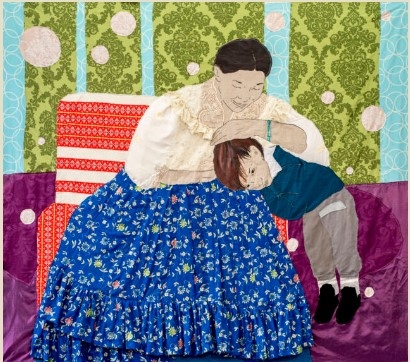Mirga-Tas’s colourful visual narratives integrate references to art history, personal observations, Roma activism and historical symbols that imbue Roma identity, history and community with power and a sense of pride.
Her monumental textile works are made from clothes given to her by friends and family or found in second-hand stores near her home in the village of Czarna Gòra on the Polish side of the Tatra mountains. They feature scenes from Roma everyday life, where the artist’s mother, siblings, cousins and friends are tenderly portrayed in great detail. Consistently in her works, Mirga-Tas presents women’s lives, strong female role models and Roma activists, highlighting their importance in the private and public spheres.
A centrepiece in the exhibition is a series of new textile collages showing scenes from Swedish-Roma experience. These works mix everyday situations with portraits of prominent female Swedish-Roma activists, including Singoalla Millon, Diana Nyman and Rosa Taikon, who have fought for Roma rights in Sweden. A dialogue is created, linking Roma activism across national borders and uniting a people who have lived divided and nomadic in Europe for centuries.
Suno Mangie Dzialas means I have a dream in Romani. It refers to Martin Luther King’s famous speech in 1963. The title is a powerful comment on the dreams and hopes that encompass everyday love, friendship and the importance of fellowship between all human beings, but also on the political struggles and the dream of a society free from repression, discrimination and inequality.
The exhibition is presented in collaboration with the Polish Institute in Stockholm.
Special thanks to Ingrid Schiöler, Romano Center i Väst and the pre-school Romano Ilo.




